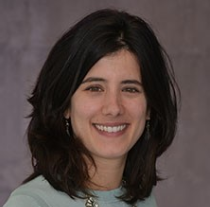FACULTY SPOTLIGHT — CAROLYN SATTIN-BAJAJ, PH.D
Dr. Carolyn Sattin-Bajaj started her position at Seton Hall immediately after defending her dissertation at NYU. During her doctoral work, she had the opportunity to conduct pilot research in Madrid, Spain over the course of two summers to learn more about Latin American immigrants’ educational integration experiences. Dr. Sattin-Bajaj worked extensively on research related to community and social support structures in different national and local contexts that facilitate immigrant integration and access to education. Prior to pursuing doctoral studies, she worked as a program manager in the Office of Multiple Pathways to Graduation at the New York City Department of Education where she was part of a team responsible for developing alternative high school models. While there, she collaborated with high school counselors and school support staff to identify and reengage older youth who were disconnected from school. This professional experience exposed her to the challenges of policy development and implementation in a highly politicized context – specifically related to the ongoing issues of unequal distribution of access to educational opportunities, particularly for disadvantaged students. Her research agenda is strongly informed by these prior professional and research experiences.
Currently Dr. Sattin-Bajaj is an Assistant Professor in the Department of Education Leadership, Management and Policy, where she teaches the qualitative research methods courses. In addition, she is a Co-Director of the Center for College Readiness. In her capacity with the Center for College Readiness, she develops research projects and organizes campus-based programming to strengthen the connection between the K-12 and higher education programs. When speaking about the students in her courses, Dr. Sattin-Bajaj reflects, “There have been a lot of great moments in my courses already, but, I think my favorite was when one student shared his first experience conducting an observation at a coffee shop and the rest of the students in the class were on the edge of their seats waiting to hear the details of one funny interaction he observed.”
Dr. Sattin-Bajaj has several pieces of advice for current students in the higher education programs. “Try not to be too focused on identifying a dissertation topic very early on.” Dr Sattin-Bajaj adds, “Narrowing your interest too early will close you off from other research interests and possibilities that may be more fruitful, and, in the end, might help you finish faster and with a better dissertation.” She also strongly encourages all students to take at least one qualitative research course during their doctoral studies, even if they are certain they will be using quantitative methods for their dissertation research and beyond. “Being exposed to multiple approaches to research, how to think about research questions and problems, and knowing about the range of social science methods is helpful to everyone,” she adds.
Her research is informed by her work with teachers, school counselors, educational leaders, higher education administrators, students, and mentees. Dr. Sattin-Bajaj notes, “Seton Hall students have incredibly valuable hands-on experience with some of the questions and issues I care deeply about from a research standpoint, and their insights help focus her work on that which is of greatest interest and import to people “on the fronts lines” of P-20 education.”
Dr. Sattin-Bajaj’s current research agenda includes continued use of qualitative methodologies to examine equity issues in policy development and implementation, particularly related to school choice and educational access for low income, immigrant-origin youth and their families. She is currently Co-Principal Investigator of the grant “Leveling the Playing field for High School Choice through Decision Supports: A Randomized Intervention Study” with Jennifer Jennings, Sean Corcoran, and Sarah Cohodes. This grant, funded just shy of $500,000 by both the William T. Grant Foundation and the Spencer Foundation builds on her earlier work with immigrant students, parents and school choice in 165 New York City middle schools.
In a related line of work, Dr. Sattin-Bajaj is working with colleagues to develop more holistic, comprehensive measures of the impact of school choice participation on students’ and parents’ longer-term engagement with bureaucratic institutions and participation in competitive processes, both within and outside of education. Another project in development will test and evaluate mechanisms to more effectively inform and engage low-income, immigrant parents of kindergarten-age students in Boston’s school choice process.

